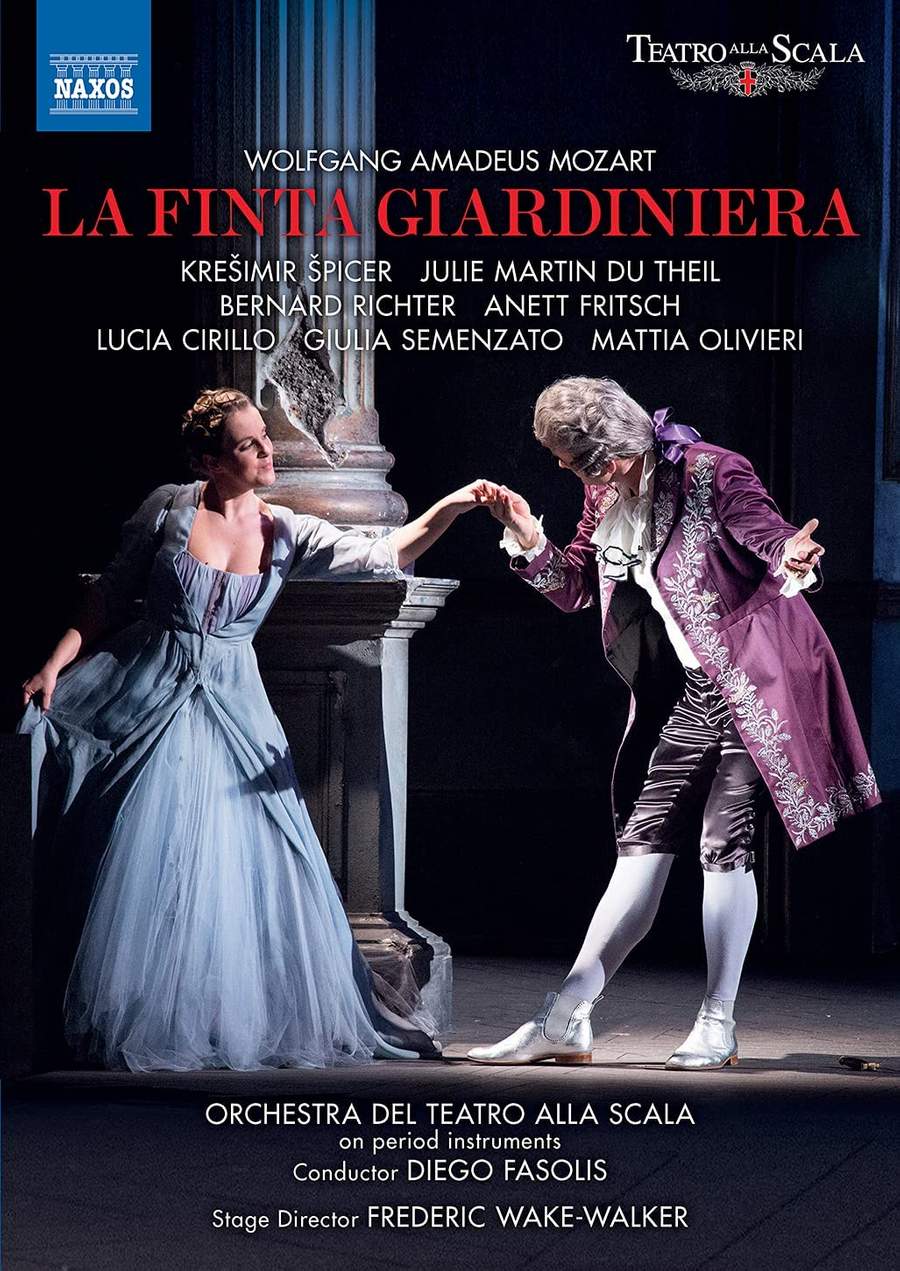MOZART La finta Giardiniera (Fasolis)
View record and artist detailsRecord and Artist Details
Genre:
Opera
Label: Naxos
Magazine Review Date: AW21
Media Format: Digital Versatile Disc
Media Runtime: 179
Mastering:
DDD
Catalogue Number: 2 110689-90

Tracks:
| Composition | Artist Credit |
|---|---|
| (La) finta giardiniera |
Wolfgang Amadeus Mozart, Composer
Anett Fritsch, Arminda, Soprano Bernard Richter, Belfiore, Tenor Diego Fasolis, Conductor Giulia Semenzato, Serpetta, Soprano Julie Martin du Theil, Sandrina, Soprano Kresimir Spicer, Anchise, Tenor Lucia Cirillo, Ramiro, Mezzo soprano Mattia Olivieri, Nardo, Baritone Milan La Scala Orchestra |
Author: Richard Lawrence
‘The Pretended Gardener’ was premiered in Munich on January 13, 1775, a fortnight before Mozart’s 19th birthday. After three performances, it was not seen again in its original form until the late 1970s, following the discovery of the missing autograph of Act 1. Revivals in the interim were based on the German-language version with spoken dialogue dating from 1780: the source, presumably, of the 1976 production by the English Music Theatre under the witty title of Sandrina’s Secret.
This version from La Scala is a restaging of the Glyndebourne production of 2014 directed by Frederic Wake-Walker. The plot is both complicated and absurd. It turns on the Marchioness Violante’s search for her lover, Count Belfiore, who had stabbed her and left her for dead after a quarrel. (This is acted out during the Overture.) Under the name of Sandrina, the marchioness has taken a job as gardener to Don Anchise, the Podestà or mayor in whose home the action is set. She is dismayed to find that Belfiore is about to embark on an arranged marriage with Arminda, the mayor’s niece (not daughter, synopsis translator!). Hanging about the place is Ramiro, Arminda’s rejected lover; then there’s the maid Serpetta, who loves the Podestà and is upset because her master loves Sandrina; and Nardo, the marchioness’s servant posing as her cousin, who loves Serpetta.
Provided you don’t look for the subtlety and roundedness of the da Ponte comedies, the opera is well worth getting to know. And it’s fascinating to observe some features of the later operas in embryo. Figaro lay a good 11 years in the future; but here are two chain finales, and at the end of ‘Appena mi vedon’ Serpetta has a phrase that anticipates Susanna emerging from the closet. Nardo, though a servant, might well remind you of Guglielmo in Così fan tutte, while the reconciliation duet for Sandrina/Violante and Belfiore looks forward to Konstanze and Belmonte in Die Entführung.
Wake-Walker has rearranged the order of the numbers in Act 2 and omitted a few arias. He has sensibly reduced the extensive secco recitative, but one of his cuts makes the plot even more confusing, leaving the audience unaware that Sandrina has not simply disappeared: she has been left by the jealous Arminda in a wood full of wild animals. And the omission of the final recitative means that you don’t see everyone paired off satisfactorily; except for the Podestà, that is, who won’t marry till he finds another Sandrina.
The setting for Act 1 is not the prescribed garden but an elegant rococo pavilion: a garden room, perhaps. The action veers from comedy to – not tragedy, but seriousness, and back again. Halfway through, Sandrina and Belfiore lose their reason, thinking themselves figures from classical myth. Wake-Walker handles all this with skill, but it is a mistake to have Arminda laugh to herself at the end of her furious G minor aria, ‘Vorrei punirti, indegno’. Anett Fritsch, so hoity-toity when she first arrives, is excellently cast.
So, indeed, are her colleagues. Krešimir Špicer, the hero of Les Arts Florissants’ production of Monteverdi’s Il ritorno d’Ulisse (Virgin, 6/04), cuts a suitably comic figure as the Podestà, though he should look older. Lucia Cirillo is touchingly heartfelt when, rudely dismissed by Arminda, Ramiro – a castrato part, unusual in a comic opera – buoys himself up with hope. Giulia Semenzato and Mattia Olivieri make a lively pair of servants. Belfiore, whose music brings Tamino as well as Belmonte to mind, is lyrically and strongly sung by Bernard Richter. His fellow Swiss, Julie Martin du Theil, is excellent in servant mode; she sounds a little stretched in the metaphor aria, ‘Geme la tortorella’. The Orchestra of La Scala on period instruments – the pitch slightly below today’s norm – play splendidly for Diego Fasolis. Even with all the cuts the opera lasts three hours: some of the numbers are overlong, but stick with it and you will be well rewarded, musically if not dramatically.
Explore the world’s largest classical music catalogue on Apple Music Classical.
Included with an Apple Music subscription. Download now.

Gramophone Digital Club
- Digital Edition
- Digital Archive
- Reviews Database
- Events & Offers
From £9.20 / month
Subscribe
Gramophone Club
- Print Edition
- Digital Edition
- Digital Archive
- Reviews Database
- Events & Offers
From £11.45 / month
Subscribe
If you are a library, university or other organisation that would be interested in an institutional subscription to Gramophone please click here for further information.






